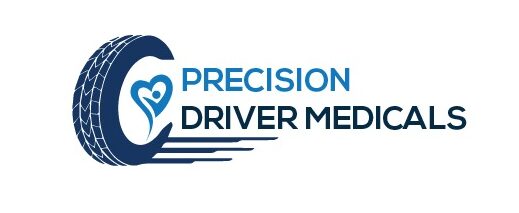Learn which medical conditions can affect your driving license in the UK. Find out when to inform the DVLA, how medical assessments work, and how Precision Driver Medicals can help you stay safe and compliant.
Introduction
Driving in the UK requires not only skill but also good health. Certain medical conditions affecting driver’s license eligibility can put both you and other road users at risk if not properly managed. The DVLA (Driver and Vehicle Licensing Agency) requires drivers to declare specific medical conditions that could impact their ability to drive safely.
At Precision Driver Medicals, we specialize in driver medical assessments to help you remain compliant with DVLA standards—ensuring your driving license stays valid while keeping you and others safe on the road.
Understanding DVLA Medical Rules
The DVLA has a list of health conditions that drivers must report. These rules apply to all drivers—whether you hold a car license (Group 1) or a lorry, bus, or taxi license (Group 2).
If you fail to inform the DVLA about a medical condition that affects your driving, you could face a fine of up to £1,000, and your license could be revoked. In case of an accident, you may also face legal consequences and insurance issues.

Common Medical Conditions That Can Affect Your Driving License
Below are some of the most common medical conditions affecting driving license eligibility in the UK.
1. Vision and Eye Conditions
Your eyesight must meet DVLA standards for driving.
Conditions to report include:
At Precision Driver Medicals, every HGV, PCV, or taxi medical includes a comprehensive eye test, ensuring your vision meets DVLA’s Group 1 or Group 2 standards.
2. Neurological Conditions
Certain brain or nervous system conditions can affect alertness, coordination, and reaction time.
You must report if you suffer from:
- Epilepsy or recurrent seizures
- Stroke or transient ischaemic attacks (TIAs)
- Multiple sclerosis (MS)
- Parkinson’s disease
- Brain tumors or serious head injuries
The DVLA may request a medical report or driving assessment to evaluate your fitness to drive.
3. Cardiovascular (Heart) Conditions
Heart-related problems can cause sudden loss of consciousness, which makes driving dangerous.
Reportable conditions include:
- Angina that occurs while resting or driving
- Heart attacks (usually license suspended temporarily)
- Arrhythmias (irregular heartbeats)
- Implanted pacemakers or defibrillators (ICDs)
- Heart failure or valve disease
Our driver medical examinations at Precision Driver Medicals include blood pressure and cardiovascular health checks, ensuring that your results meet DVLA requirements before you get behind the wheel again.
4. Diabetes
Diabetes is one of the most common medical conditions affecting driver’s license eligibility, particularly if treated with insulin. Low blood sugar (hypoglycemia) can cause sudden loss of awareness, making driving risky.
You must report your condition if you:
- Take insulin or certain oral medications
- Experience hypoglycemic episodes
- Have diabetic complications affecting vision or nerve function
Regular medical assessments help the DVLA ensure your diabetes is under control.
5. Sleep Disorders
Sleep disorders such as sleep apnea can cause daytime drowsiness, leading to reduced reaction time and focus. Drivers with moderate or severe obstructive sleep apnea syndrome must notify the DVLA.
Treatment (like CPAP therapy) often restores your driving eligibility, but proof of ongoing compliance may be required.
6. Psychiatric and Mental Health Conditions
Mental health plays a major role in road safety. You must report conditions that may affect concentration, judgment, or impulse control, such as:
- Severe anxiety or depression
- Bipolar disorder
- Schizophrenia
- Personality disorders
- Dementia or cognitive decline
At Precision Driver Medicals, our clinicians handle mental health disclosures sensitively and in full confidence, helping you navigate the DVLA medical process smoothly.
7. Alcohol and Substance Misuse
If you have a history of alcohol dependency or drug misuse, you are legally required to inform the DVLA.
A driver’s license can be suspended until evidence of recovery is provided, often through medical reports and lab tests.
Our DVLA-approved medical assessments include optional liver function testing and substance screening where required, supporting you through the reinstatement process.
8. Other Reportable Medical Conditions
You should also inform the DVLA if you have:
- Blackouts or fainting episodes
- Severe migraines or vertigo
- Limb disabilities or mobility impairments
- Serious head injuries
- Disorders causing sudden loss of consciousness
If you’re uncertain whether your condition must be declared, our doctors at Precision Driver Medicals can guide you through the DVLA medical disclosure process.

How to Report a Medical Condition to the DVLA
- Check the DVLA list of medical conditions online (gov.uk/health-conditions-and-driving).
- Complete the appropriate medical questionnaire form—such as DIAB1 for diabetes or FEP1 for epilepsy.
- Submit the form to the DVLA, who may request a medical report or ask you to attend an independent medical examination.
- Wait for DVLA’s decision—they’ll inform you whether you can continue driving, need a temporary license, or must stop driving temporarily.
At Precision Driver Medicals, we can help prepare your paperwork and medical records to ensure everything meets DVLA standards.
Why Choose Precision Driver Medicals?
We are one of the UK’s trusted providers of driver medical assessments for HGV, PCV, and taxi drivers.
Our Services Include:
- DVLA-compliant HGV medicals (D4 forms)
- Taxi and private hire driver medicals
- PCV and bus driver medicals
- Pre-employment and occupational health assessments
- Vision and blood pressure testing
- Friendly, professional service at multiple UK locations
Our Promise to Drivers
- Fast appointments—often available the same day
- Affordable pricing with transparent costs
- GMC-registered doctors experienced in driver medical standards
- DVLA-compliant reports to ensure no delays with your license renewal
Book Your DVLA Driver Medical Assessment Today
If you’re managing one of the medical conditions affecting driving license eligibility, it’s important to stay proactive. Book a DVLA driver medical with Precision Driver Medicals to ensure full compliance and peace of mind.
We’re here to help you stay licensed, stay healthy, and stay on the road safely.
Top Services
- Driver Medical
- HGV/Lorry Drivers (HGV medical)
- Taxi Drivers (Hackney Carriage & Private Hire Medical)
- Private Hire
- PCV/Bus Drivers (PCV medical)
- PCO Medical
- Bus Medical Service
- Motorhome Medical
- Ambulance Medical
- Forklift Driver Medical
- TFL Medical
Top Links
10 Important Links for Driver Medicals UK
- DVLA – D4 Medical Examination Report
→ Official D4 form for HGV/PCV drivers. - DVLA – Driving Licences for Lorry, Bus and Coach Drivers
→ Requirements for becoming a lorry or bus driver. - TfL – Private Hire and Taxi Driver Medical Requirements
→ TfL’s official medical guidelines for PCO/private hire drivers. - DVLA – Eyesight Rules for Drivers
→ Legal eyesight standards for all UK drivers. - DVLA – Medical Conditions and Driving
→ Guidance on how medical conditions affect driving eligibility. - NHS – Medical Exams for Professional Drivers
→ NHS overview of driver medical exams. - Driver & Vehicle Standards Agency (DVSA)
→ Regulator for driving and vehicle safety standards in the UK. - General Medical Council (GMC)
→ Authority for registered medical professionals in the UK. - Gov.uk – Renew Driving Licence
→ Process for renewing a UK driving licence. - National Register of LGV Instructors (NRI)
→ Training and standards for LGV/HGV instructors.


